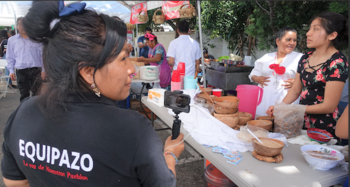Digital and Media Anthropology
Eine Internetradio-Reporterin berichtet auf zapotekisch von der food sale in Los Angeles
Image Credit: Ingrid Kummels
Soziale Medien spielten eine große Rolle beim Paro Nacional 2021.
Image Credit: Laura Malagón Valbuena
Since the beginning of this millennium, digital anthropology has been a subdiscipline of cultural and social anthropology, building on visual anthropology and media anthropology. Digital anthropology is currently an adequate and often necessary approach to study social relations in general in a qualitative and inductive way.
Social relations have always been shaped by means of communication. Users appropriate the currently widespread social media such as Facebook, Whatsapp, Twitter, Instagram, and TikTok in culturally adapted forms for screen-to-screen exchanges. Media anthropologists believe that users continue to use familiar modes of interaction with current technology.
At the same time, the use of social media and socio-digital practices are changing all those fields that are shaped by them: for example, work, leisure, political forms of organization, and the relationship between the private and the public. The dynamics of these forms of communication include their great dependence on market-leading private companies that monopolize them; state governments also operate more or less strict forms of their regulation. On the other hand, digital forms of communication offer new opportunities for remote understanding - as we are currently experiencing in the midst of the Covid 19 pandemic. Mobile and immobilized actors, such as migrants who are illegalized in the destination country, have developed a creative use of digital media for years. By using new formats, for example in the field that used to be reserved for professional journalism, they are opening up media spaces for new publics. The range of actors who make themselves known on the Internet includes all political colors and social interest groups.
Digital anthropology is one of the focal points of Cultural and Social Anthropology at the Institute for Latin American Studies. We ask about digital practices, how they mobilize users, and about the social position and impact of their platforms. What stories, cultural heritage, and knowledge are archived and disseminated through them? What public spheres are created by new actors such as ethnic influencers, digital diasporas and internet guerrillas?
Cultural and Social Anthropology at the Institute for Latin American Studies is a member of the EASA Media Anthropology Network.

